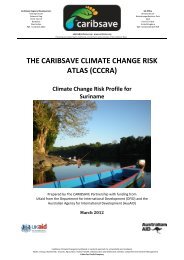You also want an ePaper? Increase the reach of your titles
YUMPU automatically turns print PDFs into web optimized ePapers that Google loves.
6. RECOMMENDED STRATEGIES AND INITIAL ACTION PLAN<br />
The following recommendations have been developed in consultation with national <strong>and</strong> community<br />
stakeholders through the use of various participatory tools. They support the main objective of the CCCRA<br />
which is to provide a scientific (physical <strong>and</strong> social) basis to support decision making, policy <strong>and</strong> planning by<br />
governments, communities <strong>and</strong> the private sector that increase resilience of economies <strong>and</strong> livelihoods to<br />
climate change. The recommendations are also consistent with the strategies <strong>and</strong> programmes identified in<br />
the Climate Change <strong>and</strong> the Caribbean: A Regional Framework for Achieving Development Resilient to<br />
Climate Change endorsed by the CARICOM Heads of State.<br />
Recommendations are presented as an initial plan of action with a brief description of the intervention, the<br />
national <strong>and</strong>/or local stakeholders involved <strong>and</strong> the expected benefits, <strong>and</strong> are categorised according to<br />
short-, medium- <strong>and</strong> long-term interventions. All recommendations are considered ‘No-regret’ or ‘Lowregret’<br />
strategies. 'No-regret' strategies seek to maximise positive <strong>and</strong> minimise negative outcomes for<br />
communities <strong>and</strong> societies in climate-sensitive areas such as agriculture, food security, water resources <strong>and</strong><br />
health. This means taking climate-related decisions or actions that make sense in development terms,<br />
whether or not a specific climate threat actually materialises in the future. ‘Low-regret’ adaptation options<br />
are those where moderate levels of investment increase the capacity to cope with future climate risks.<br />
Typically, these involve over-specifying components, for example installing larger diameter drains or<br />
hurricane shutters at the time of initial construction or refurbishment (World Bank, 2012).<br />
Each one or a group of recommendations can be further developed into a concept note or project proposal<br />
with a full action plan, with much of the supporting information found in this document. Earlier sections of<br />
this report have provided the rationale for recommended interventions based on the vulnerabilities <strong>and</strong><br />
adaptive capacity identified for key sectors.<br />
6.1. Cross-Cutting Actions<br />
The following activities must be undertaken in the short-term, across a number of sectors, to ensure the<br />
success of the more specific <strong>and</strong> practical recommendations presented in later sections. These cross-cutting<br />
actions provide the necessary foundation, in terms of information <strong>and</strong> data, development policy,<br />
awareness raising <strong>and</strong> cross-sectoral linkages from which wider actions to combat the threat of climate<br />
change on future development can be legitimised. With this foundation, future actions <strong>and</strong> the allocation<br />
of resources to adaptation <strong>and</strong> mitigation activities are more easily justified because decisions can be based<br />
on current information, as well as common goals <strong>and</strong> a widespread underst<strong>and</strong>ing of the severity of the<br />
threat.<br />
6.1.1. Data Collection, Monitoring <strong>and</strong> Evaluation<br />
It is evident in a number of sectors that the lack of data <strong>and</strong> inadequate monitoring <strong>and</strong> evaluation<br />
procedures inhibit the ability of the relevant agencies to plan <strong>and</strong> manage a number of resources.<br />
Monitoring <strong>and</strong> evaluation is essential if progress is to be demonstrated. By collecting <strong>and</strong> sharing the<br />
information gathered, Section 6.1.3, it is possible to gain even greater support amongst stakeholders.<br />
Specific areas <strong>and</strong> suggestions for data collection, monitoring <strong>and</strong> evaluation include:<br />
166





